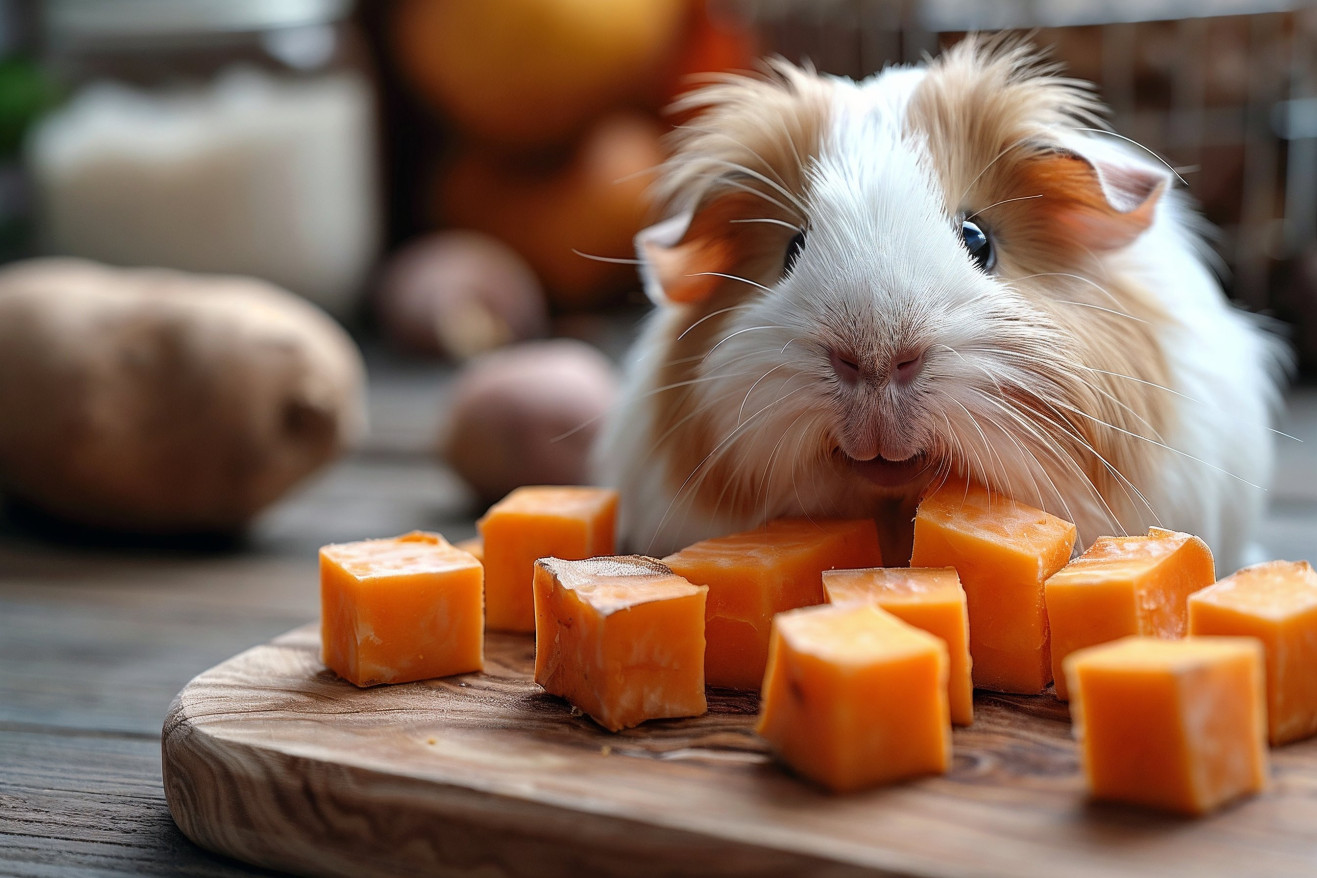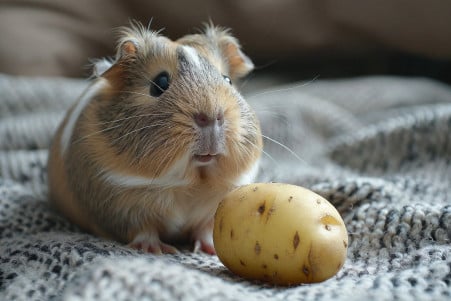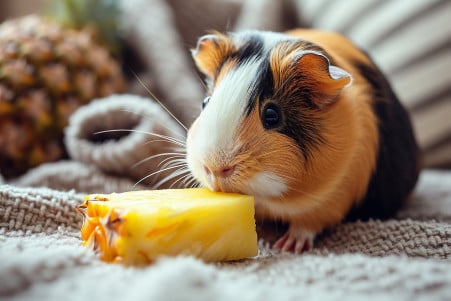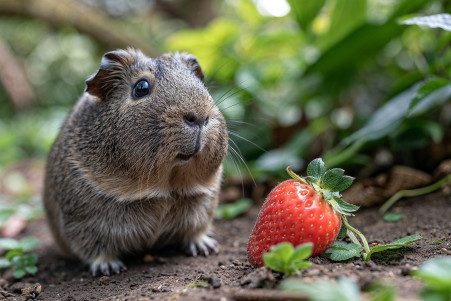Can Guinea Pigs Eat Sweet Potatoes? Nutritional Guidelines and Safe Feeding Practices
16 March 2024 • Updated 15 March 2024

Sweet potatoes are healthy, but can you share their benefits with your guinea pig? Guinea pigs can have sweet potatoes as a treat, and they offer vitamin C and potassium.
However, because they are high in sugar, you should only give them to your guinea pig once or twice a week. Make sure to give them raw and cut into small pieces, and be sure to wash them thoroughly to remove any dirt and pesticides.
This article will explore veterinary advice and nutritional research to help you understand the dietary requirements of guinea pigs. We will also look at studies on their digestive systems and the impact of different nutritional factors, including the starches and sugars found in sweet potatoes, to give you a complete picture of how to meet your guinea pig’s nutritional needs while sharing this root vegetable with them.
Can guinea pigs eat sweet potatoes?
How to Make Sure Your Guinea Pig’s Diet Is Well-Balanced
Guinea pigs need a high-fiber diet and must get vitamin C from their food. As the NCBI Bookshelf explains, guinea pigs in the wild eat a variety of plants, so they need a high-fiber diet to support their digestive system.
The Humane Society of the United States says that a well-balanced diet for guinea pigs should consist of fresh grass hay, such as Timothy or orchard hay, which should make up about 80% of their daily food intake.
Vegetables are important for providing essential nutrients and should be a part of a guinea pig’s diet. Leafy greens, including romaine lettuce, kale, and parsley, are good sources of vitamin C, according to UK Pet Food. However, an unbalanced diet can lead to a number of health problems, including obesity, dental disease (due to their teeth growing constantly), and bladder stones (which can be caused by too much calcium or oxalates).
Sweet potatoes can be part of a well-balanced diet for guinea pigs, but it’s important to make sure they’re fed in moderation. You should also be aware of their sugar content and the potential for them to contribute to oxalates so that you can make sure they’re helping to balance your pet’s diet rather than throwing it off.
And, as always, when you’re introducing a new food, make sure to do so slowly to help ensure your guinea pig’s well-being.
The Guinea Pig’s Specialized Digestive System: A Summary
Guinea pigs have a specialized digestive system that is adapted to the high-fiber diet of grasses and other wild plants that they would eat in the wild. Supreme Petfoods explains that the large intestine and the caecum are important for nutrient absorption, and the caecum is especially important because it is the site of the microbes that ferment fiber.
This enables guinea pigs to get the energy and nutrients they need from the fiber in their diet. However, guinea pigs also have a specialized way of processing food; they practice coprophagy, which is the consumption of their own special fecal pellets called caecotrophs, to get the nutrients that are only available in the early stages of digestion.
This specialized digestive system raises the question of how guinea pigs digest sweet potatoes, which are high in starch and sugar. While sweet potatoes can provide some nutrients, including vitamin C, as The Guinea Pig Vet explains, they are not part of a guinea pig’s natural diet and should be fed in moderation.
It’s important to know how their digestive system works to make sure you’re feeding them in a way that keeps them healthy and prevents digestive problems that can occur if they’re fed the wrong foods.
Risks of Feeding Sweet Potatoes to Guinea Pigs
While sweet potatoes can be a healthy addition to your guinea pig’s diet because of the vitamins and fiber they provide, there are also some risks associated with feeding them to your pet. One of the most important risks is their sugar content. According to Healthline, sweet potatoes contain sugars, such as glucose and fructose, that can lead to obesity and diabetes in guinea pigs if they are consumed in high amounts.
Another risk is the oxalates found in sweet potatoes. A case study in PMC by Dr. Marie K. Holowaychuk describes a guinea pig that developed renal failure after consuming plants that contained oxalates.
While sweet potatoes have lower oxalate content than some of the other foods that are on the list of foods that are toxic to guinea pigs, they still contain oxalates, which can increase the risk of kidney stones and other kidney problems when consumed in high amounts.
The fact that sweet potatoes contain both sugar and oxalates makes it especially important to feed them to your guinea pig in moderation.
Oxbow Animal Health suggests that treats, including sweet potatoes, should make up no more than 2% of a guinea pig’s diet.
To make sure you don’t put your guinea pig at risk, feed them sweet potatoes in small amounts infrequently and make sure that their diet is primarily made up of hay, fresh water, and guinea pig-formulated pellets. This will help ensure that your pet doesn’t experience any of the potential negative side effects of eating these root vegetables.
Sweet Moderation: How Much Sugar Should Be in a Guinea Pig’s Diet?
Guinea pig owners should be mindful of the sugar content in their pets’ food. Guinea Lynx explains that while sugar is a natural part of many fruits and vegetables, too much sugar can cause an imbalance in the gut microbiome and lead to the proliferation of harmful bacteria. This can lead to a decrease in the guinea pig’s ability to digest more complex foods like hay, which should be the foundation of their diet.
The consequences of too much sugar in the diet are serious. Obesity and diabetes are common problems in guinea pigs, and as Guinea Pig Piggles points out, the symptoms of these conditions are similar to those in humans, including weight loss and increased thirst. They recommend a diet that is high in hay and low in sugary foods like vegetables such as sweet potatoes and fruits to prevent these issues.
When it comes to giving your guinea pig treats, it’s important to make sure you’re balancing them with the rest of their daily diet.
In the case of sweet potatoes, this means giving them to your guinea pig in moderation, always in raw, bite-sized pieces, and making sure to balance them with other low-sugar vegetables.
This will help ensure that your guinea pig is getting the nutrition they need while also protecting their health. By learning about the sugar content and health risks associated with it, as reported by the USDA food database and reputable publications, you can make the best choices to ensure that your pet is both healthy and happy.
A Healthy Snack: Can Guinea Pigs Eat Sweet Potatoes?
Guinea pigs can eat sweet potatoes, but they should be fed to them with caution and in moderation. The nutritional analysis has shown that sweet potatoes offer some potential benefits, including vitamin C and potassium, and that they should be served raw and in small amounts after being washed.
It has also explained the nutritional needs of guinea pigs, including the need for fiber and vitamin C, and the potential pitfalls of an unbalanced diet, which can result in obesity and other health problems.
The article explained that guinea pigs’ digestive systems are adapted to a high-fiber diet and that it’s important to be careful when feeding them starchy, sugary foods like sweet potatoes. It also explained that going over the sugar limit can lead to obesity and diabetes, which is why it’s important to balance these types of foods with a diet that’s mostly made up of hay and low-sugar vegetables.
In conclusion, being a good pet owner means understanding and meeting the nutritional needs of guinea pigs, as well as understanding the potential dangers of certain foods. By practicing moderation and informed feeding, pet owners can help ensure that their beloved furry friends live long and healthy lives.


